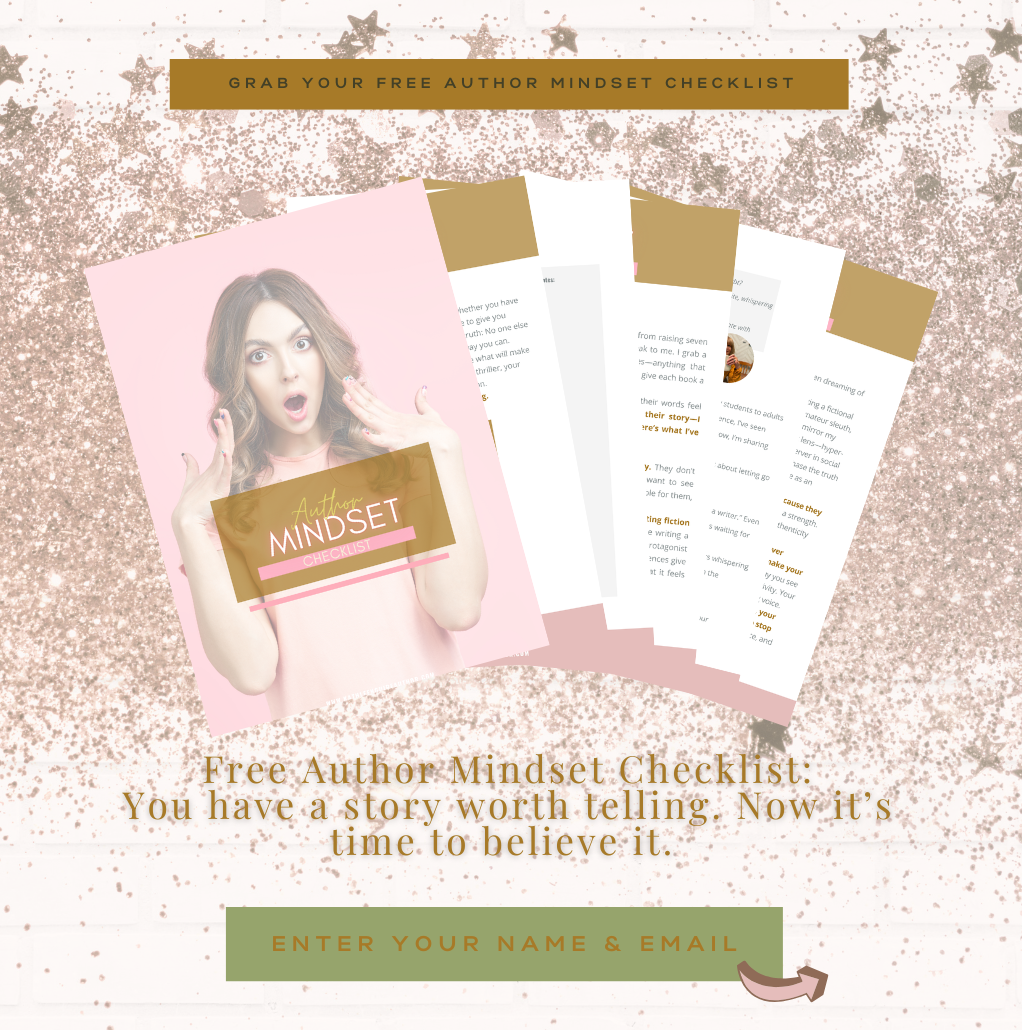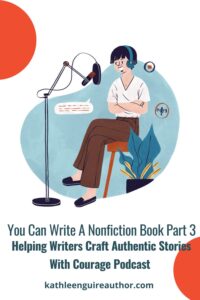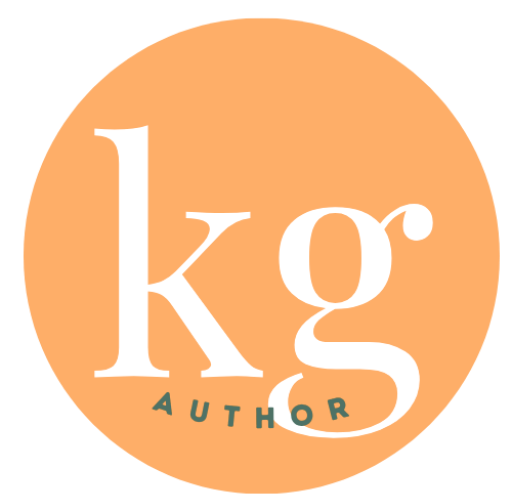Helping Writers Craft Authentic Stories With Courage Podcast Episode 15
Show Notes You Can Write A Nonfiction Book – Part 3
Hi, Kathleen Guire here. Welcome to this episode of helping writers craft authentic stories with courage. So I’ve been doing a little series on a new checklist that is a freebie on the website. Kathleenguireauthor.com. You can just click on that red button that says, Grab my checklist. Or it says something similar to that, something about a checklist. Sometimes I can’t remember everything that I put on my website, but that is there. Click on it. You will get it emailed to you directly, and you can follow along with me as I talk through the checklist.

I think I am a Kinesthetic learner, which means I have to hear it, I have to write about it, I have to talk about it. I mean, I have to do all the things. And if it’s something that requires you to do something physical, like make a cake, I can’t just listen to the directions and make the cake right the first time. If I’m following the directions and really paying attention, I might make it. But the point is, I have to do it as well.
A Family Of Writers
And that’s one of the reasons I wanted to talk through the checklist, because maybe you started following me on Instagram or Facebook and you’ve been reading some of my posts and you’re kind of like, well, I do want to write a book, but I don’t know if I should do it or if I’m an expert or if I have the qualifications. And then you start asking your friends, which sometimes can go pretty well. Other times it can go the opposite direction, because maybe your friend is like, well, which is one of the things that were said to me. Kathleen, don’t you have a math degree? I do not have a degree in creative writing. I don’t. And the thing is, that kind of held me back for years. Like, I’m not a writer. I have a family full of writers. My mom was a writer. My dad. A family full of writers. My great uncle’s twins, Norton and John, they’re both were journalists and poets and both wrote amazing things. But I didn’t go that route in my education, mostly because when I was going to college, it was the big thing, and it still is. Math and science for girls. Math and science for girls. And I think that’s amazing if you’re really good at math and science. My sister-in-law is amazing at engineering. She teaches engineering. Okay, so that’s not the point. The point is, I did not major in anything to do with writing, and it really held me back. It gave me a limiting belief in my mind for a long time, which is kind of hilarious because I got my degree in education, and then I homeschooled my kids. And because I homeschooled my kids, my education philosophy changed. I learned that learning is lifelong, and I taught my kids how to educate themselves. Not when they were three. I didn’t give them an encyclopedia, even though probably one of mine could have read that just because that’s the way she was. Not because of anything to do with me, but it was this whole new way of learning. Like, oh my goodness, you’re interested in cars. Let’s learn everything there is to know about cars. And that particular child, my youngest, he like superseded, like, super, pass me up. He knows the name of every kind of car, and what kind of engine they have. But my point is, I did not apply that to myself for a long time.

Struggling with self-doubt as a writer? You’re not alone.
Every writer faces that little voice whispering, “Who am I to write this?” But here’s the truth—mindset is the biggest difference between writers who finish their books and those who don’t. 🚫 You don’t need more time.
🚫 You don’t need permission. ✅ You need the right mindset.
Hey, you’re interested in writing? Learn about writing. Interest in becoming a writer? Find out what it takes to become a writer. Interested in writing a book? Find out what it takes to write a book. And above all, write because writers write. That’s what writers do. I did have a friend reach out to me, direct message me on Instagram and say, you know, your posts have been really encouraging and helping me and I have now written like 6000 words. And I was like, yes, that’s what I want to see for you. If you have a desire to write a book, then do what writers do. First of all, they say, I am a writer. I am a writer. It took me so long to say those words. I used to say, I want to be a writer, or I wish I was a writer or everybody in my family as a writer I wish it had rubbed off on me.
Own Your Identity As A Writer
But until you own your identity as a writer, that doesn’t mean that’s all you are. You know, people get really freaked out about the word identity, especially if you’re a Christian. I’m not speaking Christianese here. Yes, our identity is in Christ, and I believe that. But we have other identities. We have other purposes that God has given us. And if God has given you that desire to write a book, especially about something that you’ve overcome or trauma you’ve lived through or something that you have purposed in your life to say, hey, this is a thing that my family has struggled with for years. I am going to learn everything I can about this and overcome it.
Like, maybe you didn’t have good parenting and you’re not blaming your parents anymore for that. That’s not where you’re living. You’re like, how do I become a good parent? So you’re reading all the books and you’re looking up all the Bible verses and then all of a sudden you’re like, oh my gosh, I want to help other women who are stuck in this situation. So that’s just an example, but let me get back to the checklist. So download the checklist, super simple. And then the checklist is first after the little intro to me in the PDF, and then read through the PDF.

Struggling with self-doubt as a writer? You’re not alone.
Every writer faces that little voice whispering, “Who am I to write this?” But here’s the truth—mindset is the biggest difference between writers who finish their books and those who don’t. 🚫 You don’t need more time.
🚫 You don’t need permission. ✅ You need the right mindset.
Or as you’re listening to me, look at the checklist and work your way through it. I’ve already talked about it, and if you missed them, you can go back and listen to them. You are the expert on your own life. So if you’re struggling with I’m not an expert. Well, guess what? You are the number one expert on your own life. So even if you don’t feel like an expert, like, you don’t have a bunch of letters after your name, or maybe you do, but you still don’t feel like an expert, everybody struggles with Imposter syndrome.
Limiting Beliefs
That is a limiting belief that will hold you back from writing your book. And let me ask you this question, which I ask on Instagram, you know, five years down the road, where do you want to be? Like, if you don’t write your book five years down the road, what will that feel like to you? And I’m paraphrasing what I said. But I said that on Instagram.
So whatever your struggles are or were, become your passion, and those are the things that you want to help every person who has that same struggle. Now, it’s like that Bible verse, which I’m greatly paraphrasing. It’s like God has comforted us in something, whatever our troubles were, and then we comfort others with that same comfort. And it can be in a form of a book.
You know what I look for when I’m struggling with an issue? I don’t look for a paragraph on social media, even though I appreciate those little encouraging paragraphs. When I am really struggling with an issue, I look for a book. Like, give me a book, let me highlight in it, let me write in it. Yes, I do that. Let me repeat it and converse with my husband or my friends about it so I get it solidified in my mind so that I can learn something. And because I’m learning something, I can begin to change my mindset. And because my mindset changes, my life can begin to change.
Experience Creates Experts
So the second one, which I’ve already talked about, is- experience creates experts. So whatever you’ve experienced and you’ve grown through and learned about, you’ve become an expert in, and somebody else is just out there waiting for you to write that book and help them going through that experience. And maybe you could help them when they’re at zero so that they don’t have to go all the way to ten- ten being the worst scenario. They don’t have to go all the way there because they read your book and like, oh my gosh, I’m at number one. But she said when this happened to her, this is what she did. And I use this example a lot.
I have celiac disease, so I could write a book about everything I’ve learned about living with celiac disease, and I could list all the resources I’ve used, all the websites, and all the recipes. I’m not going to do that right now. But if you were diagnosed with celiac disease today, and I had a book written on that, then you could just say, oh, my goodness, instead of trying to find all this stuff myself, I don’t know where to start. For instance, you start with cleaning out your pantry, wiping everything down with vinegar, and all of these sorts of things that I had to learn. If you got that book, like, this is where I start. This is what I do first, so we don’t need to panic.
You Have A Powerful Transformational Story To Tell
And then number three, you have a powerful transformational story to tell. Honestly, do you know what people want to hear? They want to hear stories of transformation that the author lived. I kind of have this funny habit, and I talk about it in the PDF when I go to the library. And this is kind of born out of having seven children. We’d go to the library, and everybody had to get their books. And so I was helping because you have to go through your kids like, hey, can I read this one with the demon on the front? No, you can’t. Let’s find another one. So I would spend a lot of my time helping the kids, which was my job. That’s what I’m supposed to do. And then it’s like, okay, you have 60 seconds, mom, to run down the aisle and choose some books that you are going to read. So I would just grab some, like some authors. I knew I would want to read more of her stuff or more of his stuff, but sometimes it was just I don’t really have a list. And I would just grab a bunch of books and check them out and take them home. And then I gave them a trial run for a few chapters. And what I was looking for was, does this book have a transformational story to tell? Did this author live through something? And these are nonfiction books I’m talking about. Well, even with a novel, did the character have a good transformation? Did they have a transformational story to tell?
But I’m talking about nonfiction here. If after two or three chapters, I was like, you know what? This is just a book long rant of the author saying, well, this happened to me, and this person did this, and this happened to me, and I’ve had a terrible life, and I was not finishing it. Or if it was a book full of theory that, oh, if you just simply follow this theory. But I’ve never lived it because I wrote this in my office, which I never leave, like, no, not finishing it. I’ve checked out lots of books like that. Like, no, I want to know that the author lived through a transformation. And not only that, but can that author take that transformation and break it down for me so that I have these points or these suggestions or these checklists, or this okay, I did it wrong for this many years, and then I learned this, and then I tried this and this worked for me. So it might work for you. Yes, that’s what I want. I’m not saying like some legalistic jargon that is like, you have to do this, this, and this and this.
- How did you change?
- What changed you?
- How did you go from feeling constantly anxious and depressed and overwhelmed because of all this trauma,
- all of these things, and reliving these experiences,
- to being able to cope and have coping mechanisms and
- ways of eating that enhance your brain and your life?
And I’m just spewing things out there. That may not be your story at all. I don’t know what your story is, but I do know this.
Summing it up:
You’re the expert on your story. You’ve lived it, and you have a transformational story to tell.
And I also know this. If you have a desire to write and it’s waking you up at night, or you wake up in the morning and the first thing you think is, oh my gosh, I need to start that book, don’t walk around in guilt and shame.
Don’t walk around with the I should, I should take time today to put it on your calendar. Take time today to sit down and make an effort. Just start writing.
And maybe you’re struggling with direction, like, well, I want to write, but I really need a framework to help me. I really need something to guide me. Like, I don’t want to just sit there and write in circles. I did that in my first book, because first of all, it took me twelve years to write because I was home-schooling kids at the time. And I did take a memoir writing class, so that was important and it gave me somewhat of a framework, but because I was writing so inconsistently, what I found was I would go back and read the chapters that I’d written and I was like, oh my goodness, I am saying the same thing or telling the same stories over and over. I need some consistency. You have to write consistently. Now, last week I sent out to my email list a chapter framework that walks you through my nonfiction chapter formula. It walks you through how to write a chapter, a powerful transformational chapter. And using that framework, you can write chapter after chapter after chapter until you have a complete book.
Now, if you’re not on my email list, you can email me. I’ll put that in the show notes, and get on my email list. First of all, get your checklist, but email me and say, hey, I want that chapter framework. I need that. And I will be happy to send it to you because I want to see you get your story out into the world in the form of a book, if that is your desire. So I’m finishing up for today.
Next week I’ll be talking about- no one else can tell your story the way you can, because, like I said, you are the expert on you. Let me finish up with just this one statement. It’s so powerful, so true. There are a group of readers who need to hear what you have to say. Somebody’s waiting for you to write that book.
I said I was finishing up this one more thought, it’s just like this has been a reoccurring thought to me the past week. If you’re not writing your book because you don’t know if it’s going to sell or how many people are going to read it, think about the one-on-one principle. If you could help one person by writing your book, then write your book, which you can write your book to that person. And all the other details about marketing and publishing and all of those things, those are next step things. Those are not first-step things. Those will come, and those will be topics on my podcast later. Because once you get that book written, I don’t want you just putting it in a drawer or keeping it on your virtual bookshelf on your computer. I want you to get your story out into the world. So thanks for joining me today, and I’ll see you next week. Bye.

Struggling with self-doubt as a writer? You’re not alone.
Every writer faces that little voice whispering, “Who am I to write this?” But here’s the truth—mindset is the biggest difference between writers who finish their books and those who don’t. 🚫 You don’t need more time.
🚫 You don’t need permission. ✅ You need the right mindset.
Pin it:


